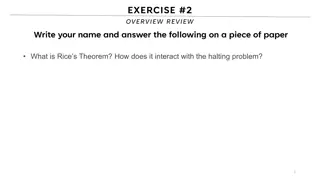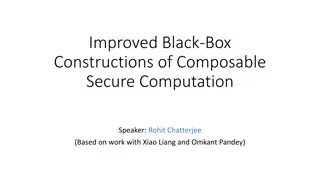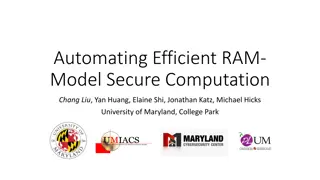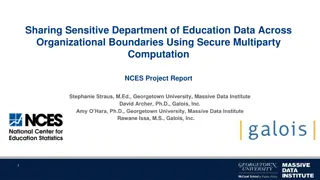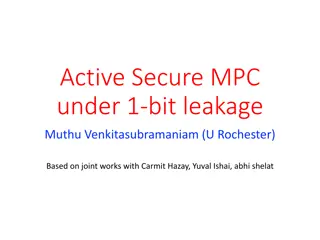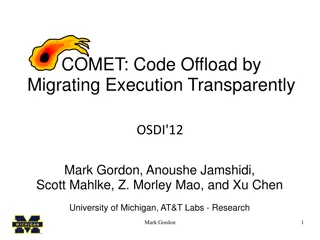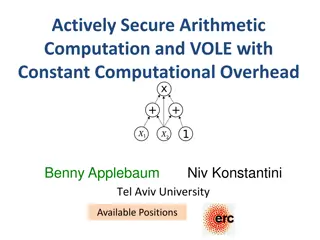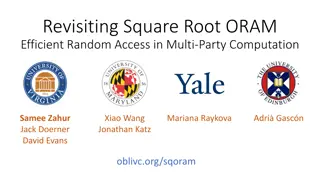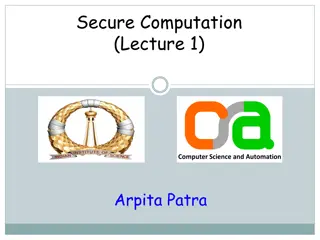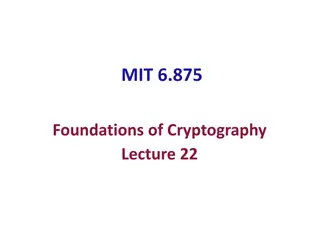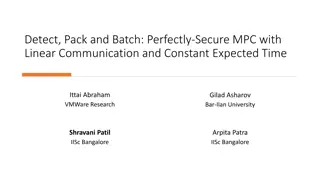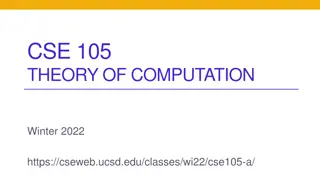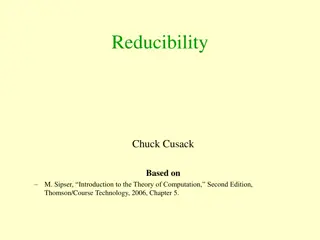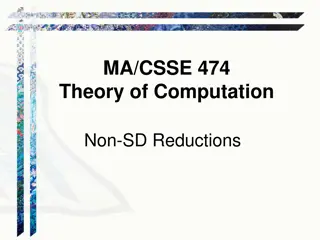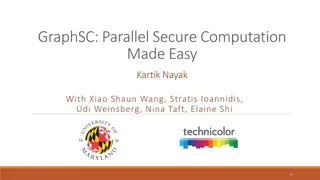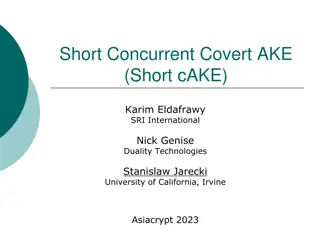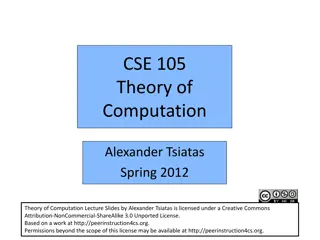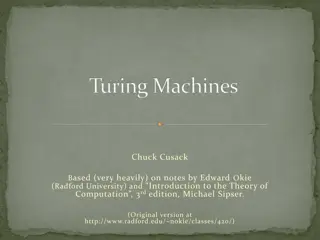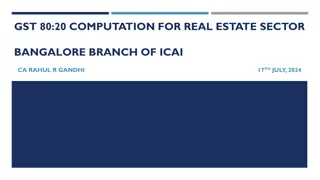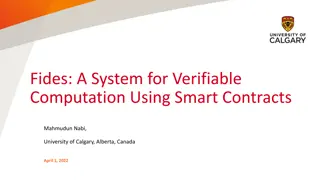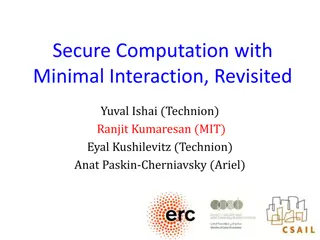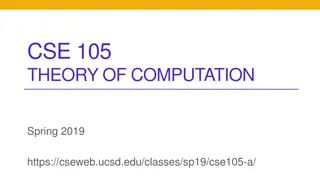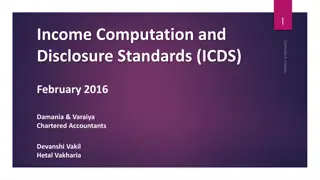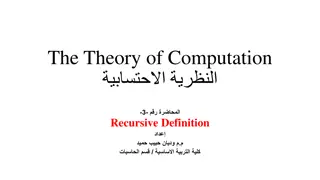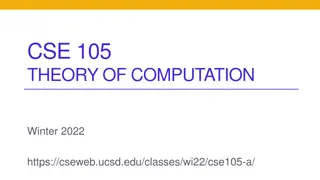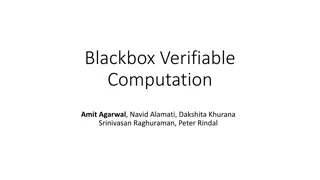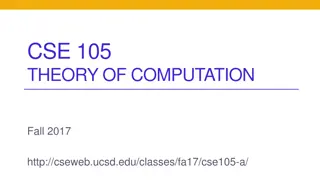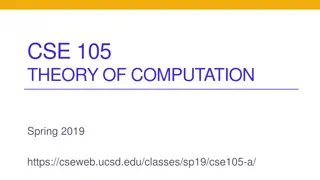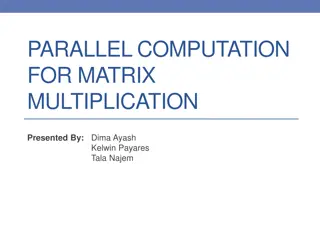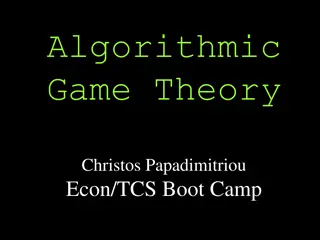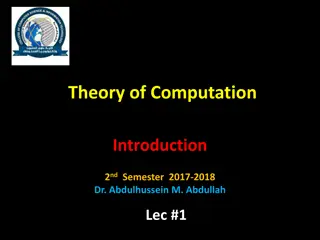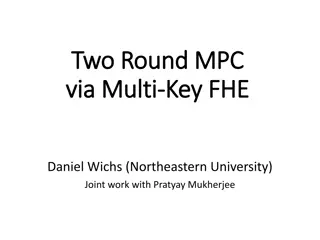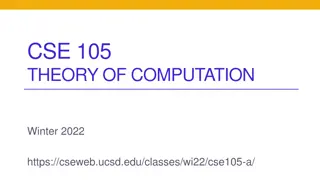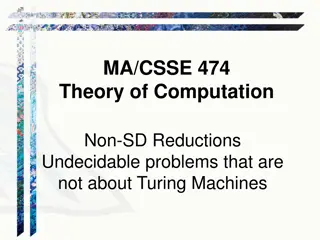Computability: Exploring Theoretical Limits of Computation
Delve into computability theory, focusing on what is computable and the limits of computation. Explore concepts like Rice's Theorem, the Halting Problem, and classes of expressiveness in computability theory, such as combinational logic, finite-state machines, pushdown automata, and Turing machines.
5 views • 43 slides
Evolution of Mathematical Theories and Proof Systems
Development of mathematical theories such as model theory, proof theory, set theory, recursion theory, and computational complexity is discussed, starting from historical perspectives with Dedekind and Peano to Godel's theorems, recursion theory's golden age in the 1930s, and advancements in proof t
1 views • 29 slides
Enhanced Security in Multiparty Computation
Explore the improved black-box constructions of composable secure computation, focusing on definitions, objectives, and the formalization basics of multiparty computation (MPC). Learn about the motivating security aspects in MPC and the real/ideal paradigm. Discover how MPC security involves compari
1 views • 68 slides
Understanding the Theory of Firms: Neoclassical vs. Modern Approaches
The theory of firms is explored through the Neoclassical and Modern perspectives. Neoclassical theory focuses on profit maximization, while Modern theory delves into managerial, principal-agent, and transaction cost theories. The discussion covers criticisms of Neoclassical theory and the essential
1 views • 79 slides
Evolution of Light Theory: From Wave Theory to Quantum Theory
At the turn of the century, the discovery of the photoelectric effect challenged the wave theory of light, leading to the development of the quantum theory by Max Planck and Albert Einstein. This new theory introduced the concept of discrete energy units known as quanta, bridging the gap between wav
1 views • 62 slides
Secure Computation Techniques in RAM Models with Efficient Automation
Explore the automation of efficient RAM-model secure computation techniques, including examples such as secure binary search. Discover how traditional solutions using circuit abstractions can be improved for sub-linear time computation through methods like Oblivious RAM. Learn about techniques such
0 views • 37 slides
Secure Multiparty Computation for Department of Education Data Sharing
This report discusses the use of Secure Multiparty Computation (SMC) to enable sharing of sensitive Department of Education data across organizational boundaries. The application of SMC allows for joint computation while keeping individual data encrypted, ensuring privacy and security within the Nat
0 views • 15 slides
Advancements in Active Secure Multiparty Computation (MPC)
Delve into the realm of secure multiparty computation under 1-bit leakage, exploring the intersection of DP algorithms, MPC, and the utilization of leakage for enhanced performance. Discover the overhead implications of achieving active security, as well as the evolution of secure computation protoc
0 views • 43 slides
COMET: Code Offload by Migrating Execution - OSDI'12 Summary
The research paper discusses COMET, a system for transparently offloading computation from mobile devices to network resources to improve performance. It outlines the goals of COMET, its design, and evaluation, focusing on distributed shared memory and bridging computation disparity through offloadi
0 views • 31 slides
Actively Secure Arithmetic Computation and VOLE Study
Exploring actively secure arithmetic computation and VOLE with constant computational overhead at Tel Aviv University. Understanding how functions are represented in secure computation using arithmetic circuits over boolean circuits. Efficiently evaluating arithmetic circuits over large finite field
0 views • 36 slides
Enhancing Multi-Party Computation Efficiency Through ORAM Techniques
Explore the realm of efficient random access in multi-party computation through the reevaluation of classic schemes and the introduction of new approaches. Discover the potential of ORAM in improving performance and reducing costs in various computational tasks, such as secure multi-party computatio
0 views • 22 slides
Exploring Secure Computation in the Age of Information
Welcome to Secure Computation Lecture 1 by Arpita Patra. The course covers evaluation policies, projects, and references in the realm of secure computation. The content delves into the significance of information security across various sectors, emphasizing the importance of safeguarding sensitive d
0 views • 36 slides
Secure Two-Party Computation and Basic Secret-Sharing Concepts
In today's lecture of "Foundations of Cryptography," the focus is on secure two-party and multi-party computation, emphasizing semi-honest security where Alice and Bob must compute without revealing more than necessary. Concepts such as real-world vs. ideal-world scenarios, the existence of PPT simu
0 views • 27 slides
Linear Communication in Secure Multiparty Computation for Efficient and Fast Processing
The research focuses on achieving perfectly secure multiparty computation (MPC) with linear communication and constant expected time. It explores efficient approaches using a broadcast-hybrid model and P2P communication, aiming to balance speed and efficiency in MPC. The study highlights the importa
0 views • 23 slides
Computational Learning Theory: An Overview
Computational Learning Theory explores inductive learning algorithms that generate hypotheses from training sets, emphasizing the uncertainty of generalization. The theory introduces probabilities to measure correctness and certainty, addressing challenges in learning hidden concepts. Through exampl
0 views • 43 slides
Theory of Computation Winter 2022: Learning Goals and Key Concepts
Explore the key concepts in the Theory of Computation for Winter 2022, including decision problems, reductions, undecidability, and the relationship between HALTTM and ATM. Learn about decidable, recognizable, and undecidable problems as well as the importance of reductions in proving undecidability
0 views • 27 slides
Undecidability and Reductions in Theory of Computation
Explore the undecidability of the halting problem and ATM, using reductions to show their non-decidability. Discover how problems are reduced from A to B in computation theory, enabling the solution of one problem by solving another.
0 views • 30 slides
Automata Theory and Theory of Computation Overview
This course overview covers concepts in automata theory and theory of computation, including formal language classes, grammars, recognizers, theorems in automata theory, decidability, and intractability of computational problems. The Chomsky hierarchy, interplay between computing components, modern-
0 views • 42 slides
Understanding Non-SD Languages in Theory of Computation
Explore the concept of Non-SD languages in the theory of computation, which are larger in number compared to SD languages. Non-SD languages involve infinite search or analyzing whether a Turing Machine will loop indefinitely. Discover examples and insights into proving languages are not SD through c
0 views • 38 slides
Theories of Interest in Microeconomics II
Explore various theories of interest in economics, including the Classical Theory, Liquidity Preference Theory by Keynes, Productivity Theory, Abstinence Theory, Time-Preference Theory, Fisher's Time Preference Theory, and the Loanable Fund Theory. These theories offer different perspectives on the
0 views • 6 slides
Secure Computation Challenges and Solutions in Data Mining
Exploring the intersection of secure computation and data mining, this content uncovers key challenges such as improving algorithms, converting programs for secure computation, and addressing parallelizability issues. It highlights the importance of cryptography in ensuring data privacy and presents
0 views • 30 slides
Covert Computation: Ensuring Undetectable Engagement
Covert computation aims to conceal the fact that computation is occurring and hide engagement in certain tasks like secure computation, authenticated key exchange, and more. By making messages indistinguishable and utilizing steganographic channels, it becomes possible to keep the activities covert
0 views • 16 slides
Undecidability Proofs and Reductions in Theory of Computation
Explore undecidability proofs and reductions in the context of Theory of Computation through examples and explanations. Understand how problems are reduced to show undecidability, with demonstrations involving Turing Machines and languages. Gain insights into proving statements like the undecidabili
0 views • 21 slides
Overview of Turing Machines: Introduction, Tape, and Computation
Turing Machines are fundamental in the theory of computation, capable of recognizing all computable languages. They consist of a Finite State Machine combined with an infinite tape. The tape is initialized with input on the left end, and a TM's computation can either halt by entering special accept
0 views • 29 slides
Computation for Real Estate Sector in Bangalore Branch of ICAI
Practical overview of GST computation for real estate transactions in Bangalore, with details on old rates with ITC and new rate regime effective from April 1, 2019. The content discusses different transactions, conditions for new rates without ITC, and provides insights on the 80:20 computation met
0 views • 39 slides
Fides: A System for Verifiable Computation Using Smart Contracts
Fides presents a system for verifiable computation using smart contracts, focusing on blockchain basics, Ethereum, smart contracts, and outsourcing computation. It explores key components of blockchain, Ethereum's decentralized computing platform, properties of smart contracts, and the concept of ve
0 views • 25 slides
Insights into Secure Computation with Minimal Interaction
This paper revisits the concept of secure computation with minimal interaction, focusing on the challenges and possibilities of achieving secure multiparty computation in 2 rounds. Specifically exploring scenarios with 3 and 4 parties, the study delves into the reasons for choosing n=3, n=4, and t=1
0 views • 23 slides
Theory of Computation: Decidability and Encoding in CSE 105 Class
Explore the concepts of decidability, encoding, and computational problems in CSE 105 Theory of Computation class. Learn about decision problems, encodings for Turing Machines, framing problems as languages of strings, and examples of computational problems and their encodings. Gain insights into th
0 views • 26 slides
Overview of Income Computation and Disclosure Standards (ICDS)
The Income-tax Act, 1961 introduced Income Computation and Disclosure Standards (ICDS) to be followed by certain assesses for computation of income. ICDS applies to taxpayers using the mercantile system of accounting from the Assessment Year 2016-17 onwards. Non-compliance with ICDS can lead to Best
0 views • 49 slides
Introduction to Recursive Definitions in The Theory of Computation
Explore recursive definitions in the realm of computation theory through examples like defining sets of even numbers, factorial language, palindrome strings, and more. Learn how to prove properties using recursive rules and construct languages with specific patterns and constraints.
0 views • 10 slides
Understanding Computational Problems in Theory of Computation
Today's learning goals in the Theory of Computation class include understanding high-level algorithm descriptions, proving the existence of undecidable languages using counting arguments and diagonalization, and encoding inputs for Turing Machines. Computational problems can be reframed as languages
0 views • 28 slides
Blackbox Verifiable Computation Scheme Overview
This summarized content discusses the concept of blackbox verifiable computation, focusing on the challenges faced by clients and servers, the role of helper oracles, positive results utilizing homomorphic encryption, and background information on Random Self Reducible (RSR) functions. The protocol
0 views • 20 slides
Theory of Computation Fall 2017 Course Details and Guidelines
This content provides information about the Theory of Computation course offered in Fall 2017 at UCSD. It covers learning goals, introductions, the use of clickers, logistics including homework, exams, and office hours, tips on how to excel in the course with integrity, and guidelines on academic in
0 views • 40 slides
Exploring Theory of Computation: Undecidability and Counting Arguments
Dive into the world of theory of computation with a focus on undecidability, counting arguments, and examples of non-Turing recognizable languages. Discover the intricacies of proving problems as undecidable and delve into the concepts of Turing-recognizable sets and deciders for complex computation
0 views • 22 slides
Parallel Computation for Matrix Multiplication
Matrix multiplication is a fundamental operation with diverse applications across scientific research. Parallel computation for matrix multiplication involves distributing the computational workload over multiple processors, improving efficiency. Different algorithms have been developed for multiply
0 views • 36 slides
Evolution of Algorithmic Game Theory in Computer Science
The evolution of Algorithmic Game Theory (AGT) in the realm of Computer Science showcases the intersection of economics and theoretical computation. Before 1995, notable researchers like von Neumann and Megiddo laid the foundation for AGT. Concepts such as computation as a game, bounded rationality,
0 views • 62 slides
Theory of Computation Introduction: Dr. Abdulhussein M. Abdullah
Delve into the theory of computation with Dr. Abdulhussein M. Abdullah in the 2nd semester of 2017-2018. Explore the fundamental questions regarding what can be computed, computational problems, and the representation of information. Gain insights into computational models and computability, complex
0 views • 27 slides
Advanced Techniques in Multi-Party Computation
Explore cutting-edge methods in Multi-Party Computation (MPC), including leveraging Fully Homomorphic Encryption (FHE) for minimal round complexity, constructing MPC directly via FHE techniques, and simplifying multi-key FHE constructions for efficient decryption. Learn about key concepts such as di
0 views • 17 slides
Theory of Computation: Winter 2022 Learning Goals and Examples
Exploring the theory of computation in the Winter 2022 CSE 105 course at UCSD, focusing on identifying sets of strings as regular, context-free, or neither. Learning about DFA, NFA, PDA, Turing machines, and computational power. Discovering specific non-context-free languages and exploring closure p
0 views • 24 slides
Undecidable Problems in Theory of Computation
Explore the concept of undecidable problems in the theory of computation, focusing on non-SD reductions and undecidable problems not involving Turing Machines. Learn about proving languages are not SD, using examples like AanBn and creating reductions to show non-SD properties. Work through reductio
0 views • 31 slides
